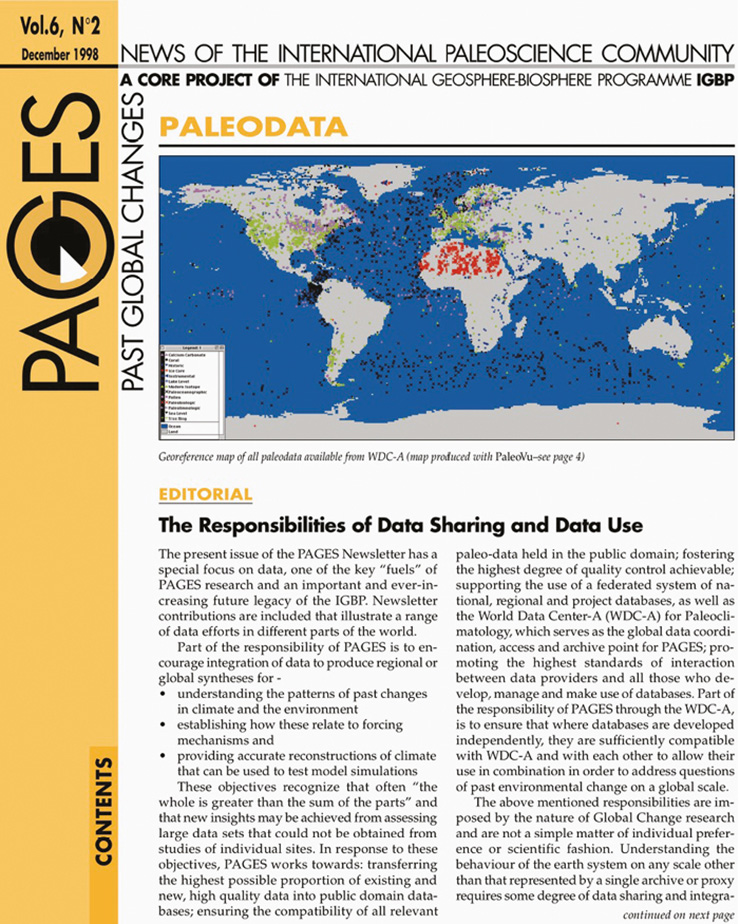- Home
- Publications
- PAGES Magazine
- SSC Editorial: New Data-availability Procedures Echo PAGES’ Long-standing Commitment
SSC Editorial: New data-availability procedures echo PAGES’ long-standing commitment
PAGES Scientific Steering Committee
Past Global Changes Magazine
26(2)
48
2018
PAGES Scientific Steering Committee*
 |
|
Figure 1: 1998 winter issue of PAGES news, with the PAGES SSC editorial on data stewardship. |
The last time Past Global Changes Magazine highlighted the power of open paleodata was exactly 20 years ago. The cover page of the winter 1998 issue (PAGES IPO 1998; Fig. 1) featured an editorial by the PAGES Scientific Steering Committee (1998) entitled, “Responsibilities of Data Sharing and Data Use.” Our predecessor Scientific Steering Committee members anticipated that open paleodata would fuel discoveries in past global changes. Their initiative has grown into the ongoing PAGES Data Stewardship Integrative Activity1, and led to our recent alliance2 with other international scientific organizations in efforts to make data publicly accessible. The 1998 editorial laid the groundwork for the first PAGES data policy by encouraging the transfer of “the highest possible proportion of existing and new, high-quality data into public domain databases…” so that access to data “…is truly easy and open to all.”
We are announcing updated and expanded procedures3 for making data available, with the goal of maximizing the long-term scientific benefit of the data generated as part of all PAGES-related activities, while fulfilling PAGES’ obligation to its funders. The new PAGES guidelines build on the earlier policy and are reinforced by the FAIR (findable, accessible, interoperable, and reusable) data stewardship principles (Wilkinson et al. 2016), which have been endorsed by scientific organizations globally. They focus on publications and are adapted for paleoscience from the Author Guidelines4 that are now being implemented by all major publishers of Earth and Space Sciences, as motivated by the Enabling FAIR Data Project5. They have benefited from input from managing and chief editors of paleo journals, repositories, and the community. For example, the new procedures now provide guidelines on the use of data embargoes, a topic that emerged from the paleoscience community open discussion6 as part of the PAGES 2k open-paleodata implementation pilot (Kaufman and PAGES 2k special-issue editorial team 2018).
The 1998 editorial also called for new “realistic ways of both recognizing and rewarding the generosity of all who submit their data.” The importance of crediting data generators and the value of making data reusable for future scientists is now being addressed with the advent of data citations and journals dedicated to data products. PAGES encourages the use of data citations7, which are analogous to standard bibliographic citations, but give explicit credit to data producers, with greater exposure and citation of their work. For large-scale synthesis products, PAGES promotes the use of data-oriented publications as a means to including many data generators in the production of value-added, high-visibility data products, with inclusive authorship.
In addition to new avenues for crediting data generators, attitudes toward open data have evolved over the past two decades, and they evolve with individual’s careers. Unfortunately, data that are not properly curated are liable to be lost to subsequent reuse; the time comes too quickly when the data that were made “available upon request” may never be discovered or used in future studies; a true loss for all. Now, with new means for making data available, the rewards, including higher citation rates and other benefits described by Newton (p. 52), are proportionally greater. Scientists, especially those early in their career, seek to increase the impact and recognition of their research by facilitating the reuse of their results. Indeed, according to the survey conducted by the PAGES Early-Career Network (Koch et al., p. 54), 95% of the 163 non-tenured respondents feel that data sharing is advantageous to their careers.
We recognize that data stewardship requires substantial effort, but we are convinced that the benefits outweigh the (perceived) costs. It is increasingly obvious that the future of our field depends on robust and widely adopted data-sharing practices and procedures. We appreciate the community’s foresight and dedication to data that are open and reusable, while curtailing the loss of valuable data.
*PAGES scentific steering committee
A. Asrat (Addis Ababa University, Ethiopia); P. Braconnot (Lab. des Sciences du Climat et de l’Environnement, Gif-Sur-Yvette; E. Brook (Oregon State University, USA); E. Capron (British Antarctic Survey, UK); C. Chiesi (University of São Paulo, Brazil); M.N. Evans (University of Maryland, USA); P. Gell (Federation University Australia, Australia); L. Gillson (University of Cape Town, South Africa); H. Goosse (Université catholique de Louvain, Belgium); Z. Jian (Tongji University, China); D.S. Kaufman (Northern Arizona University, USA); M. Kucera (University of Bremen, Germany); K. Meissner (University of New South Wales, Australia); W. Tinner (University of Bern, Switzerland); B.L. Valero-Garcés (Spanish National Research Council, Spain); Y. Yokoyama (University of Tokyo, Japan).
contact
Darrell S. Kaufman: Darrell.Kaufman nau.edu
nau.edu
references
PAGES IPO (1998) PAGES news 6(2)
PAGES Scientific Steering Committee (1998) PAGES news 6: 1-2
Kaufman DS, PAGES 2k special-issue editorial team (2018) Clim Past 14: 593-600
Wilkinson MD et al. (2016) Sci Data 3: 160018
links
1pastglobalchanges.org/ini/int-act/data-stewardship
2pastglobalchanges.org/news/2062-pages-data-agreements-aug-18
3pastglobalchanges.org/data/data-guidelines
4copdess.org/enabling-fair-data-project/author-guidelines/
5copdess.org/enabling-fair-data-project/